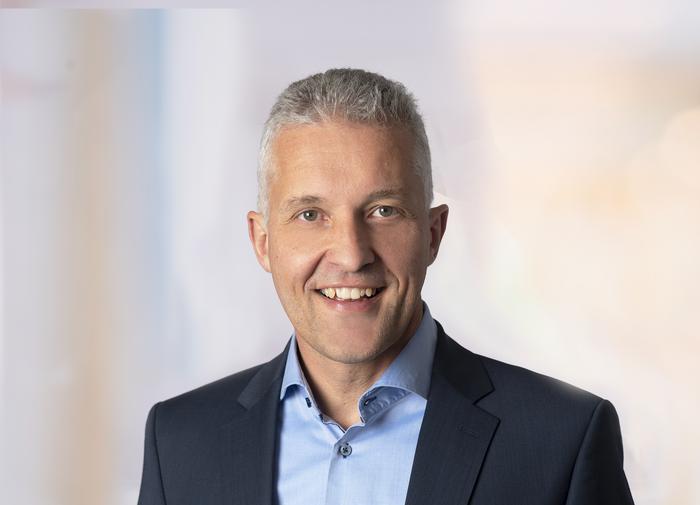How can inflammatory responses be stimulated or inhibited? How do inflammasomes act as inflammatory switches at a molecular level? Prof. Dr. Matthias Geyer from the Institute of Structural Biology at University Hospital Bonn, the transdisciplinary research area “Life & Health” and the ImmunoSensation2 Cluster of Excellence at the University of Bonn is carrying out research into these and other questions. The scientist has now been awarded a coveted Advanced Grant from the European Research Council (ERC) for this project. The European Union will provide total funding of around 2.5 million euros over the next five years.

Credit: Photo: Katharina Wislsperger/University Hospital Bonn
How can inflammatory responses be stimulated or inhibited? How do inflammasomes act as inflammatory switches at a molecular level? Prof. Dr. Matthias Geyer from the Institute of Structural Biology at University Hospital Bonn, the transdisciplinary research area “Life & Health” and the ImmunoSensation2 Cluster of Excellence at the University of Bonn is carrying out research into these and other questions. The scientist has now been awarded a coveted Advanced Grant from the European Research Council (ERC) for this project. The European Union will provide total funding of around 2.5 million euros over the next five years.
The body uses inflammation to protect itself from pathogens or foreign matter, such as when you have a thorn in your thumb. The immune system then kicks into high gear to get rid of the invader and any damaged tissue. Yet this inflammation can overreach and attack the body’s own cells which means that the body’s defense mechanisms walk a fine line. “The key is understanding at a molecular level how certain inflammation factors are activated in humans and how we might possibly selectively inhibit them,” says Prof. Dr. Matthias Geyer from the Institute of Structural Biology at University Hospital Bonn, who is also a member of the transdisciplinary research area “Life & Health” and the ImmunoSensation2 Cluster of Excellence at the University of Bonn.
This is precisely the aim of his project “Exploring inflammasome activation and targeted inhibition” (NalpACT), for which Prof. Geyer will receive funding of 2.5 million euros over the next five years in the form of an Advanced Grant from the European Research Council (ERC). Geyer will carry out research into how inflammasomes are activated and whether it is possible to make targeted changes to them. “An inflammasome is a factor in inflammatory response that plays an important role in both acute and also chronic inflammation,” explains the Head of the Institute of Structural Biology. The human body has various such inflammasomes – a type of inflammatory switch – of which NLRP3 is currently the best studied.
Congratulations from the Rector
“Anybody awarded a grant by the ERC beating competition from across the whole of Europe must be conducting cutting-edge scientific research. Matthias Geyer is without doubt one of the most prominent international researchers in structural biology and beyond,” says Rector Prof. Dr. Dr. h.c. Michael Hoch. “I would like to offer him warm congratulations on behalf of the University of Bonn for this outstanding recognition of his excellent work.”
How can the inflammatory switches be turned off?
Geyer now plans to work together with two postdocs and three doctoral students to decrypt the three-dimensional structure of the proteins that form the inflammasome and investigate where exactly it can be found in the body’s cells. Ultimately, he wants to carry out research into how to “turn off” this inflammatory switch again. “Last year, we discovered a specific binding site through which NLRP3 can be deactivated by small molecules,” reports Geyer. These molecules prevent it from moving into an active state and the protein is thus frozen in its inactive state. “We now want to transfer these findings to other proteins of the inflammasome.”
In addition, Geyer wants to investigate how inflammation triggered by the inflammasome results in cell death. This question is important for research into dementia because, for example, brain cells die off in Alzheimer’s disease. This research has a huge range of potential applications: “We have already been contacted by companies who want to develop new drugs to combat inflammation triggered by the inflammasome,” reports Geyer. “This includes drugs that can also pass through the blood-brain barrier.”
The European Research Council (ERC) awards Advanced Grants to outstanding researchers that want to open up new research areas. It will give the structural biologist the opportunity to concentrate on important questions in inflammation research unencumbered by short-term constraints. “It is a huge blessing and will give me the freedom to expand and advance our research.”
Profile
Matthias Geyer, born in Aurich in 1964, studied physics and mathematics and received his PhD in biophysics at the Max Planck Institute for Medical Research in Heidelberg. He then qualified as a professor of biochemistry at the University of Heidelberg. He has carried out research at the University of California in San Francisco (USA), the European Molecular Biology Laboratory in Heidelberg, the Max Planck Institute of Molecular Physiology in Dortmund and at the research center caesar in Bonn. In 2014, he was appointed Chair of Structural Immunology at the University of Bonn. He has been the Scientific Director of the Institute of Structural Biology since 2017, is a co-founder of IFM Therapeutics LLC, Boston-Bonn, and holds a patent.




